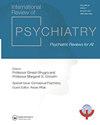自杀风险的评估和管理:精神科医生应该知道的
IF 3.7
4区 医学
Q1 PSYCHIATRY
引用次数: 0
摘要
摘要自杀是一个世界性的重大公共卫生问题,学者们现在认识到这一现象的多因素视角。然而,精神疾病通常被认为是自杀风险的主要决定因素,精神科医生通常被要求评估和管理这种风险。医学模型的建立表明,治疗精神障碍的首要任务是减少自杀行为的可能性。然而,这种模式似乎过时了,并且意味着对这种复杂现象的整个管理依赖于精神科医生的治疗。在他们的核心角色中,精神病学家和其他人物可以通过适当的自杀风险评估和适当的治疗计划文件来合理地预测未来。在不可预测性方面,临床医生应将自杀现象与可预测性联系起来,并适当执行护理标准,以确保对医疗法律案件提供充分保护。精神科医生应该接受培训,通过临床技能评估和管理自杀风险,同时培养与患者、家属和其他临床医生的联盟。本文介绍了自杀风险制定的重要性,通过深入研究自杀情景对每个患者进行正确分类,以及精神疼痛作为减少每个独特患者主要痛苦来源的关键因素的作用。关键词:自杀精神评估管理护理标准披露声明作者声明无利益冲突他希望披露,在过去两年中,他曾接受过讲座和顾问委员会荣誉,或与Angelini Pharma, Janssen, Lundbeck, MSD, Otsuka, Rovi, Pfizer, Fidia, Viatris和Recordati进行临床试验活动,所有这些都与本文无关。本文章由计算机程序翻译,如有差异,请以英文原文为准。
Assessment and Management of Suicide Risk: What Psychiatrists Should Know
AbstractSuicide is a major public health issue worldwide, and scholars now recognise the multifactorial perspective of this phenomenon. However, psychiatric disorders are often considered the main determinant of suicide risk, and psychiatrists are commonly requested to assess and manage such a risk. The establishment of the medical model suggests that treating mental disorders prioritises reducing the probability of a suicidal gesture. However, this model appears obsolete and implies that the entire management of such a complex phenomenon relies on psychiatrists’ treatments. In their central role, psychiatrists and other figures can reasonably anticipate the future by proper suicide risk assessment and appropriate documentation of therapeutic plans. In its unpredictability, clinicians should relate the suicidal phenomenon to foreseeability, with proper implementation of the standard of care, which ensures adequate protection from medical-legal instances. Psychiatrists should be trained to assess and manage suicide risk through clinical skills while fostering alliances with patients, families, and other clinicians. The article introduces the importance of suicide risk formulation, the correct categorisation of each patient by an in-depth study of the suicidal scenario, and the role of mental pain as a critical factor for reducing the main sources of suffering in each unique patient.Keywords: Suicidepsychiatryassessmentmanagementstandard of care Disclosure statementThe author declares no conflicts of interest. He wishes to disclose that in the last two years, he has received lecture and advisory board honoraria or has engaged in clinical trial activities with Angelini Pharma, Janssen, Lundbeck, MSD, Otsuka, Rovi, Pfizer, Fidia, Viatris and Recordati, all of which are unrelated to this article.
求助全文
通过发布文献求助,成功后即可免费获取论文全文。
去求助
来源期刊

International Review of Psychiatry
PSYCHIATRY-
CiteScore
5.10
自引率
0.00%
发文量
85
期刊介绍:
The International Review of Psychiatry is the premier review journal in the field with a truly international authorship and readership. Each bimonthly issue is dedicated to a specific theme relevant to psychiatry, edited by recognized experts on the topic, who are selected by the Editors and the Editorial Board. Each issue provides in-depth, scholarly reviews of the topic in focus. The Journal reaches a broad international readership including clinicians, academics, educators, and researchers who wish to remain up-to-date with recent and rapid developments in various fields of psychiatry. It aims to be of value to trainees by choosing topics of relevance to career development, which are also suitable for clinicians for continuing professional development.
 求助内容:
求助内容: 应助结果提醒方式:
应助结果提醒方式:


